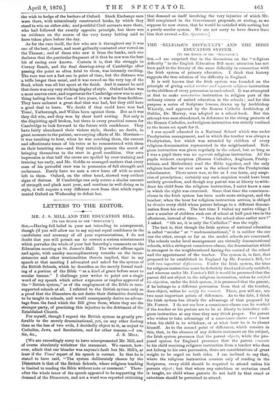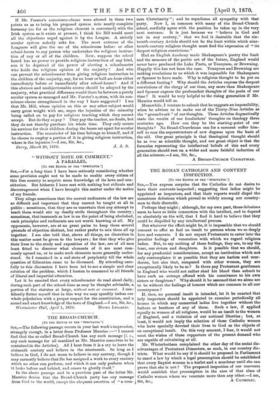THE 'RELIGIOUS DIFFICULTY' AND THE IRISH EDUCATION SYSTEM.
[TO THE EDITOR OF THE "SPECTATOR."] SIR, —I am surprised that in the discussions on the "religious difficulty" in the English Education Bill more attention has not been paid to the history of the same difficulty in connection with the Irish system of primary education. I think that history suggests the true solution of the difficulty in England.
It is well known that the Irish system was founded on the
principle of giving united secular and separate religious instruction to the children of every persuasion in each school. It was attempted at first to make unsectarian instruction in religion part of the ordinary course of united education in the schools ; and for this purpose a series of Scripture lessons, drawn up by Archbishop Whately, and approved by the Roman Catholic Archbishop of Dublin, Dr. Murray, was adopted as a school-book. But this attempt was soon abandoned, in deference to the strong protests of the Roman Catholics, and religious instruction was strictly confined to the hours set apart for it.
I was myself educated in a National School which was under
Presbyterian management, and in which the teacher was always a Presbyterian, but which was attended by children of every religious denomination represented in the neighbourhood. Reli- gious instruction was given regularly in the school, but so long as I was a pupil there was no separate religious instruction. All the pupils without exception (Roman Catholics, Anglicans, Presby- terians, and Methodists) read the Bible together, and the only religious teacher we ever saw in the school was the Presbyterian schoolmaster. There never was, so far as I can learn, any suspi- cion of proselytism ; certainly any such suspicion would have been entirely groundless, and though any parent was at liberty to with- draw his child from the religious instruction, I never knew a case in which the right was exercised. Since that time the conscience- clause in the Irish system has been made more stringent, and the teacher, when the hour for religious instruction arrives, is obliged to dismiss every child whose parent belongs to a different denomi- nation from his own. The last time I visited my native village I saw a number of children rush out of school at half-past two in the afternoon, instead of three. " Does the school close earlier now ?"
I asked. "Oh no, it is only the Catholics !" was the reply.
The fact is, that though the Irish system of national education
is called "secular" or " undenominational," it is neither the one nor the other, except so far as the model schools are concerned. The schools under local management are virtually denominational schools, with a stringent conscience-clause, the denomination which is strongest in the neighbourhood having the control of the school and the appointment of the teacher. The system is, in fact, that proposed to be established in England by Mr. Forster's Bill, but with two important differences. Under the Irish system, the time for religious instruction must be definitely fixed and clearly notified ; and whereas under Mr. Forster's Bill it would be presumed that the parent did not object to the religious instruction, unless he notified his objection, under the Irish system, it is presumed that the parent, if he belongs to a different persuasion from that of the teacher, does object, unless he notify his consent. These, you will see, are two most important points of difference. As to the fiist, I think the Irish system has clearly the advantage of that proposed by Mr. Forster. I do not see how a conscience-clause can be worked if the teacher or his pastors are to be at liberty to introduce reli- gious instruction at any time they may think proper. The parent who wishes to take advantage of a conscience-clause sm.,/ know when his child is to withdraw, or at what hour he is to absent himself. As to the second point of difference, which consists in this, that, in the absence of any definite statement on the subject, the Irish system presumes that the parent objects, while the pro- posed system for England presumes that the parent consents to his child receiving religious instruction from a teacher who does not belong to his own persuasion, there are considerations of great weight to be urged on both sides. I am inclined to say that, where the religious instruction consists only of reading in the Scriptures, every child should be required to attend unless his parents object ; but that where any catechism or sectarian creed is taught, no child whose parents do not hold to that creed or catechism should be permitted to attend. If Mr. Forster's conscience-clause were altered in these two points so as to bring his proposed system into nearly complete harmony (so far as the religious element is concerned) with the Irish system as it exists at present, I think his Bill would meet all the objections urged against it by the League. A strictly secular system nobody asks for. The most extreme of the Leaguers will give the UEC of the schoolroom before or after school-hours to any person who undertakes the religious instruc- tion of any or all of the children. Now, suppose the school board has no power to provide religious instruction of any kind, can it be deprived of the power of electing a schoolmaster who holds the religious opinion of the majority ? And who can prevent the schoolmaster from giving religious instruction to the children of the majority, say, for an hour or half-an-hour either immediately before or immediately after school-hours? And if this obvious and unobjectionable course should be adopted by the majority, what practical difference would there be between a purely secular system so managed and Mr. Forster's ay stem, with its con- science-clause strengthened in the way I have suggested? I see that Mr. Mill, whose opinion on this or any other subject would carry great weight with me, urges the injustice of the minority being called on to pay for religious teaching which they cannot accept. But do they so pay ? They pay the teacher, no doubt, but they do not thereby purchase his whole time. They only secure his services for their children during the hours set apart for secular instruction. The remainder of his time belongs to himself, and if he choose to employ a portion of it in giving religious instruction, where is the injustice ?—I am, Sir, &c.,



































 Previous page
Previous page